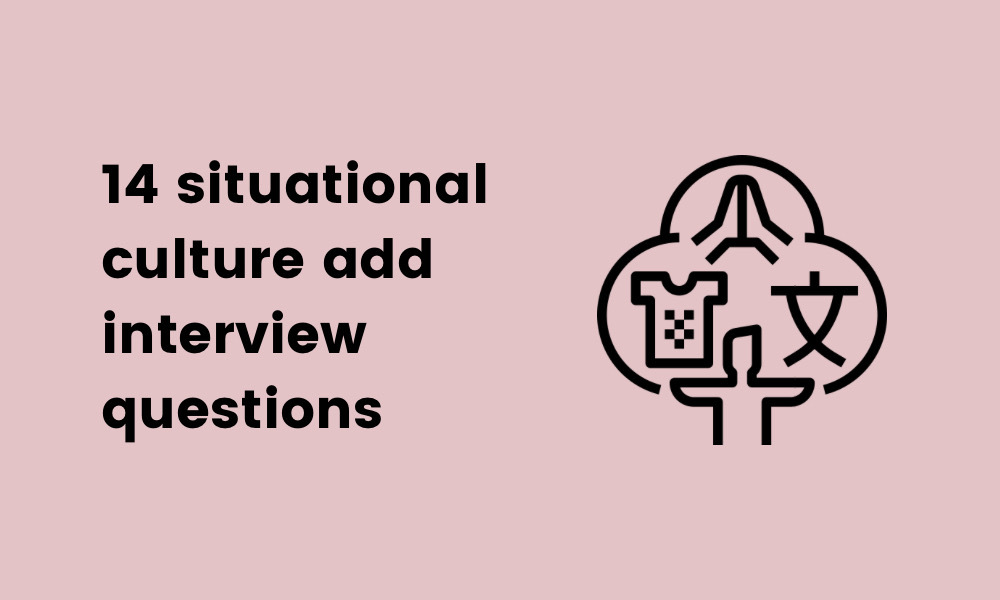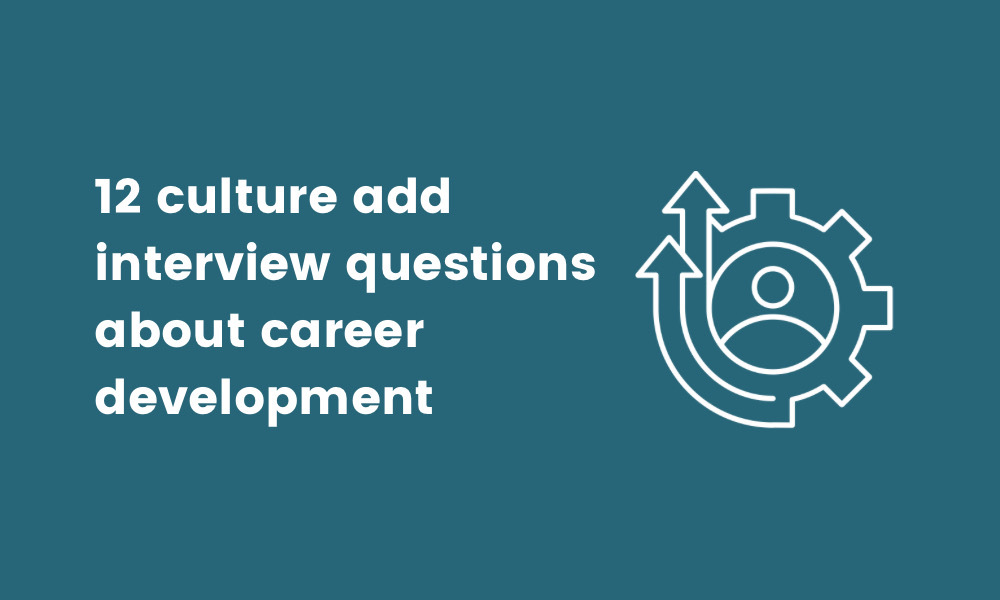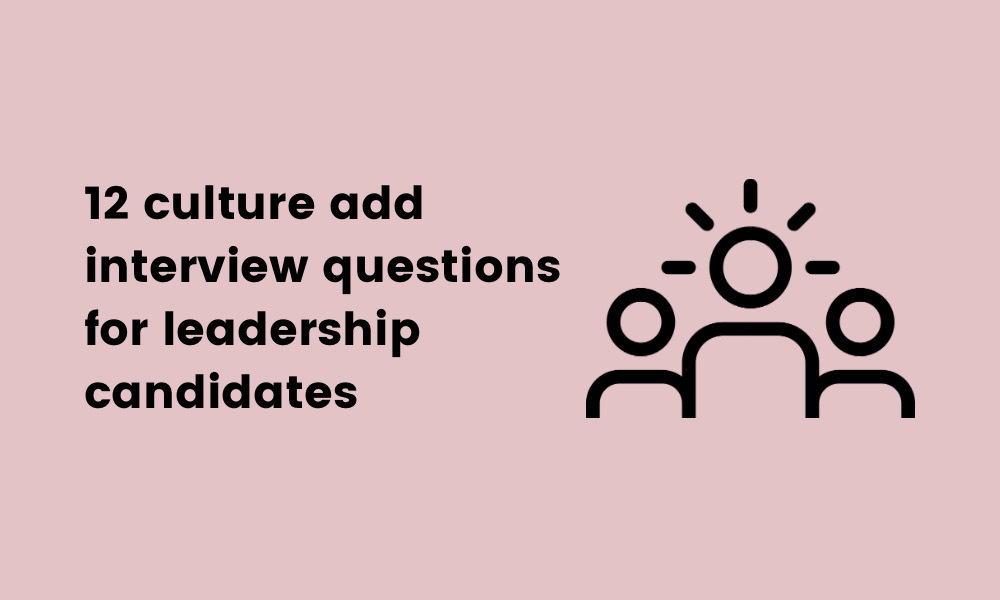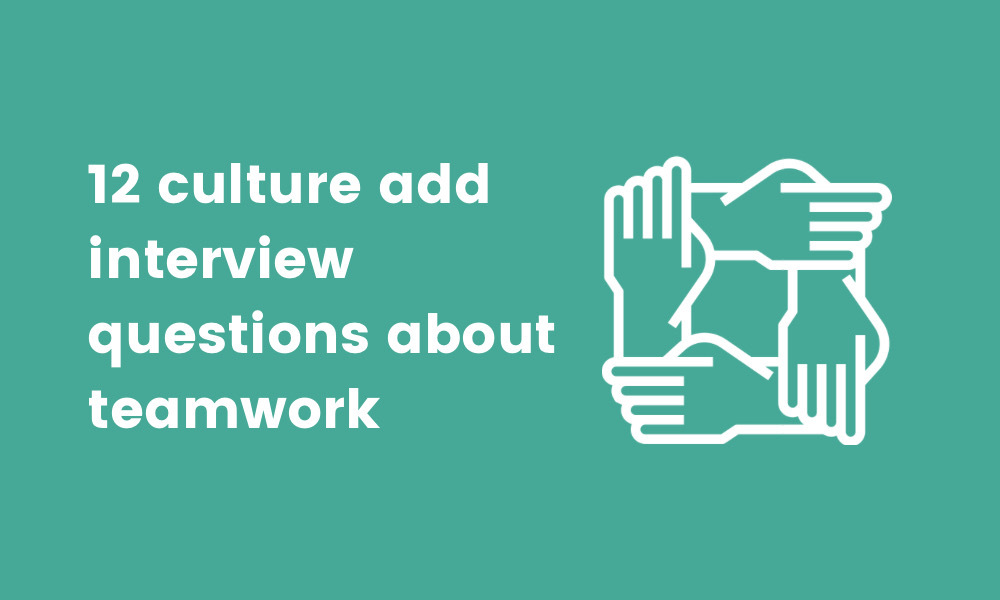50 culture add interview questions for hiring
How important is culture add to your hiring process?
If you haven’t thought about it, it should be on your list of to-dos. Assessing culture add can help you make the right hire for your team and bring your organization success.
But how can you assess culture add?
The first and perhaps fastest way is to use a Culture Add skills test when you begin to source candidates. It’s an effective, objective way to get an insightful perspective of your candidates’ values and how they align with your organization.
The second way is to conduct an interview using the 50 culture add interview questions we have listed in this article.
Take a look at the culture add interview questions listed below to help you hire the right talent.
Table of contents
- 14 situational culture add interview questions
- 5 vital situational culture add interview questions and the answers you should look for
- 12 culture add interview questions about career development
- 5 vital culture add interview questions about career development and the answers you should look for
- 12 culture add interview questions for leadership candidates
- 5 vital culture add interview questions for leadership candidates and the answers you should look for
- 12 culture add interview questions about teamwork
- 5 vital culture add interview questions about teamwork and the answers you should look for
- When in the hiring process should you use culture add interview questions?
- Use culture add interview questions in your hiring process to find the right talent
14 situational culture add interview questions
Ask candidates these 14 situational culture add interview questions to learn how their values carry them through unique situations in the workplace.
You are tasked with learning a new skill at work. How do you ensure that you learn this skill quickly and efficiently?
You are asked to choose a team-building session. Which types of team-building tasks would you prefer to avoid?
As a senior member of the business, you are asked to attend a training session. What kinds of training sessions would inspire you the most?
If you were successful for this position and we requested a reference from your manager, how passionate and driven would they say you are?
You are asked to improve at a task that you thought went well. How would you respond to constructive feedback?
You are asked to learn more about your field of work. Which blogs or books help you achieve this?
You are assigned a new task to complete within a time limit. How do you handle this task?
You are asked to choose between two career paths: one with the same responsibilities you currently have and another with some tasks that you’ve never completed before. Which do you choose and why?
Describe a situation at work in which you finished a task but made errors. What did you do to handle the situation?
You are informed that you will have a new manager next week. Which management style would you prefer they use, and how would this change affect you?
You are offered a mentor to help you join the team. What kind of mentorship style would you prefer they use?
Have you ever had to cope with a stressful project?
How important is staying organized? Do you value organizational skills in the workplace?
You are asked to cover for a coworker, but you lack some of the skills required to do the job. What approaches would you use to carry out the tasks?
5 vital situational culture add interview questions and the answers you should look for
Below is a list of the five crucial situational culture add interview questions and the answers you’re likely to receive from top candidates.
1. You are asked to learn more about your field of work. Which blogs or books help you achieve this?
Since constant skills development is an important value, candidates responding to this question must give examples of blogs and books that they read to develop their understanding.
For example, if they are applying for a content writer position, they may read content like Backlinko’s blog to develop their understanding of search engine optimization. If they are applying for a management role, they might read books such as The Manager’s Path by Camille Fournier.
2. You are asked to improve at a task that you thought went well. How would you respond to constructive feedback?
The desire to strive for high-quality work is indispensable for any employee, especially when there is room for improvement. Ask your candidates this question not only to learn how they improve at tasks but also to find out about their values and attitude when asked to enhance projects.
For instance, if you’re hiring a teacher, they may be asked to improve their lesson plans to make them more interactive. What’s important are the steps they take to enhance the plans and their enthusiasm when making the changes.
3. You are tasked with learning a new skill at work. How do you ensure that you learn this skill quickly and efficiently?
It’s not enough for candidates to outline the steps they take to learn new skills. They also need to have drive and passion for learning, which can make it easier to gain these skills and then use them to complete difficult tasks.
Your candidates might list many approaches to learning new skills, such as watching YouTube tutorials or reading books or blogs. But since determination is an important value, dig deeper to find out if they are determined and eager to learn new skills.
4. Have you ever had to cope with a stressful project?
Meeting deadlines, implementing feedback, and keeping clients happy can be stressful. Your candidates might mention a broad range of stressful tasks that they have coped with. If they’re applying for a content writer position and mention that implementing feedback is stressful, find out which values help them to handle that task, and look for strategies and values that align with your company culture.
5. You are assigned a new task to complete within a time limit. How do you handle this task?
Candidates may respond that they first aim to understand the task. They may ask questions to clarify any aspects they don’t comprehend and then break the task down into achievable goals that make it easier to complete within the time limit. Candidates may also mention that they have a strong work ethic and describe examples of how this value helped them complete tasks in the past.
The best insights on HR and recruitment, delivered to your inbox.
Biweekly updates. No spam. Unsubscribe any time.
12 culture add interview questions about career development
The following 12 culture add interview questions will help you learn how your candidates’ values assist them with career development and progression.
Have you ever taken a professional risk that paid off?
Why is career development important to you?
Where do you see yourself in the next 10 years?
Have you ever had a setback during your professional career?
If you are not chosen for this role, what will your next steps be?
Are there any apps that would help you further your career at our company?
Which company culture suits you best?
What short-term goals will be your main priority if you are hired by our organization?
Which specific skills do you want to develop if you are hired?
What has been the most challenging aspect of your current role? What have you learned, and how has it shaped your career?
How do you handle monotonous tasks?
What kind of company culture would make it difficult for you to achieve your professional goals?
5 vital culture add interview questions about career development and the answers you should look for
Here are the five critical culture add interview questions about career development and the kinds of answers you should expect to receive from the best candidates.
1. Where do you see yourself in the next 10 years?
Ask your candidates this culture add interview question to learn about their values and career ambitions and find out whether their long-term goals align with your business.
If your candidates have researched your organization and think they can develop their skills and achieve their career goals while working there, they will be able to give examples of how they will work toward their objectives.
2. Which company culture suits you best?
Top candidates will have already done research on your company culture and may have already decided that it suits them.
Ask candidates this culture add interview question to learn whether they have researched your organization. You can then follow up by asking what their ideal team environment is to find out whether they are likely to work well within your company.
3. If you are not chosen for this role, what will your next steps be?
Since there are many possible answers to this question, you should look for responses that align with your company’s cultural values, which might include continuous development.
For instance, if your candidate lacks the Microsoft Excel skills required to create a spreadsheet related to company finances, look for answers that emphasize the candidate’s passion for learning Excel-related skills in training sessions.
Not only does this response show that your candidate is driven but also that their values align with your organization.
4. Are there any apps that would help you further your career at our company?
Apps can help your organization achieve success, though the way you use them is also important. Your company may be looking for candidates who value open communication and transparency, so the answers you receive should align with this value.
Candidates may also mention communication apps, such as Slack, or task management apps, such as Trello, and outline the advantages of these apps.
The best answers to this question will include examples of how your candidates have used these apps in previous roles to help achieve success in their careers. For instance, they may describe how an app helped them to communicate effectively with other departments located in different geographical locations.
5. Which specific skills do you want to develop if you are hired?
Since it is critical for employees of your company to improve their skills frequently, look for candidates who show a desire to learn new skills and embrace continuous learning.
For instance, if your candidates need to enhance search engine optimization for an article, they may want to develop skills related to Surfer SEO and keep their knowledge up to date by frequently learning about search engine optimization.
12 culture add interview questions for leadership candidates
These next 12 culture add interview questions are specifically for leadership candidates. Use them to learn how your candidates’ values will impact your team.
How would your team describe your leadership style and values?
How do your values help you motivate struggling team members?
Management aside, what other roles and values do you think are important as a team leader?
To what extent is a work-life balance important to you? Can you give an example of how you endorse a healthy work-life balance?
What values will you endorse and contribute to our organization if you are hired?
What actions do you take to resolve team conflicts? Are there any values that help you with conflict resolution?
How would you implement a new strategy as a leader if an organization had used a certain approach for many years?
What values help you to delegate tasks efficiently?
How do you push yourself to acquire new skills as a leader?
How do you give negative feedback to team members as a leader, and which values help you with this?
How do you motivate senior team members who are excelling in their work, and which values help you with this?
How would you coach a team member who is about to be promoted?
5 vital culture add interview questions for leadership candidates and the answers you should look for
The following list features five culture add interview questions for leadership candidates and answers to watch for.
1. How do you give negative feedback to team members as a leader, and which values help you with this?
Effective leaders are transparent and honest when giving negative feedback to team members. Can your candidate balance negative feedback with positive feedback and show that they value transparency, honesty, tact, and empathy while doing so?
2. Management aside, what other roles and values do you think are important as a team leader?
Leaders must also show that they value other aspects of the role, and these aspects should align with your organization’s cultural values.
For example, if you’re hiring an engineering manager for a software development company, you should keep in mind that management is just one aspect of that role.
Coaching is also important, so you might try to find a leader who has coaching experience and, even better, whose coaching style matches your software development team.
3. How do you push yourself and stay motivated when learning new skills as a leader?
Do your leadership candidates value continuous skills development?
Ask them this leadership culture add interview question to find out if they are driven to succeed. For instance, are they interested in developing their leadership and people management skills or their time management abilities? Compare their responses with your company’s cultural values to see if they would be a good fit.
4. What values will you endorse and contribute to our organization if you are hired?
Since the candidate you hire should have similar values to your organization, ask them this culture add interview question to find out if their vision for your team aligns with your company values.
For instance, if diversity and inclusion are crucial to your business, your leadership candidates must show that they would endorse this value and give examples of how they would do so.
5. What actions do you take to resolve team conflicts? Are there any values that help you with conflict resolution?
To resolve team conflict efficiently, it’s important that your candidate has values that match your company’s. If integrity, fairness, accountability, and inclusion are important for your team, your candidates should show that they can use these values to help resolve team conflict. For instance, your candidate might encourage open communication and accountability to resolve conflicts.
12 culture add interview questions about teamwork
How do your candidates’ values affect their ability to work in a team? Ask them these 12 culture add interview questions about teamwork to find out.
Do you prefer working independently or as part of a team?
Which values help you meet deadlines when working as part of a team?
Which communication style and values help you to share ideas clearly with team members?
How would you describe your style of work, values, and approach to tasks when working with a team?
How important are empathy and kindness when working in a team?
Do you form friendships with colleagues? How does this impact your work style?
Have you ever been unsuccessful or failed to accomplish a goal as a team? How did this shape your values for the following tasks?
How would your colleagues describe you?
Which values help you diffuse tension when working as part of a team whose members disagree with each other?
Do you consider yourself a leader or a contributor when working as part of a team? How does your work style add value to a team?
What do you enjoy about working as a team, and which values help you achieve this?
Which kinds of team members do you find difficult to work with? Is there any particular personality type that makes it difficult for you to complete a task?
5 vital culture add interview questions about teamwork and the answers you should look for
Take a look at the five vital culture add interview questions about teamwork and how to recognize good responses below.
1. Do you prefer working individually or as part of a team?
Since most organizations require their employees to work both alone and with their coworkers, it is important that candidates can handle a balance of working individually and as part of a team.
Your candidate may mention that they prefer working individually, but it’s important that they can also work as a team and provide examples of how they have previously done so. Can they describe any values that help them with teamwork, and do these values match your company’s?
2. How important are empathy and kindness when working in a team?
Candidates who also recognize that empathy and kindness can enhance relationships and performance are likely to be an asset to your team. Is your candidate able to explain that empathetic team members can understand a situation from another person’s perspective?
3. What do you enjoy about working as a team, and which values help you achieve this?
Teamwork is a valuable soft skill that helps team members share ideas and increase productivity. Since it can be beneficial for your organization’s staff, your candidates should recognize the importance of working as a team. They should have similar values to your business that help them work as part of a team, including empathy, honesty, motivation, and skill development.
4. Which communication style and values help you to share ideas clearly with team members?
Some of the important values your candidates may mention in response to this culture add interview question are transparency, inclusion, and honesty. These values can help them communicate efficiently and thereby better help team members complete tasks.
5. How would your colleagues describe you?
What you’re looking for in responses to this question are values or traits that align with your company and the role you’re hiring for. For example, candidates may mention that their colleagues describe them as leaders and innovators. Leaders must also be able to give examples of how these qualities or values have been useful in previous roles.
When in the hiring process should you use culture add interview questions?
It’s a good idea to use culture add interview questions near the beginning of the hiring process but after you start sourcing candidates and have requested that they complete a skills assessment.
This makes your screening process more efficient and helps you to first screen out unsuitable candidates (by analyzing skills assessment results) and spend time learning about the qualified candidates whom you know have the skills needed for the position.
Use culture add interview questions in your hiring process to find the right talent
Despite the challenges you might encounter when hiring talent for your organization, there are a couple of ways to make hiring easier. The most efficient way to assess your candidates is to use culture add interview questions combined with a skills assessment.
TestGorilla’s comprehensive skills assessments will help you learn if your candidates’ values match your organization’s. Take a look at our skills tests, and choose from this list of culture add interview questions to reliably hire the best talent. Get started for free today
You've scrolled this far
Why not try TestGorilla for free, and see what happens when you put skills first.


















